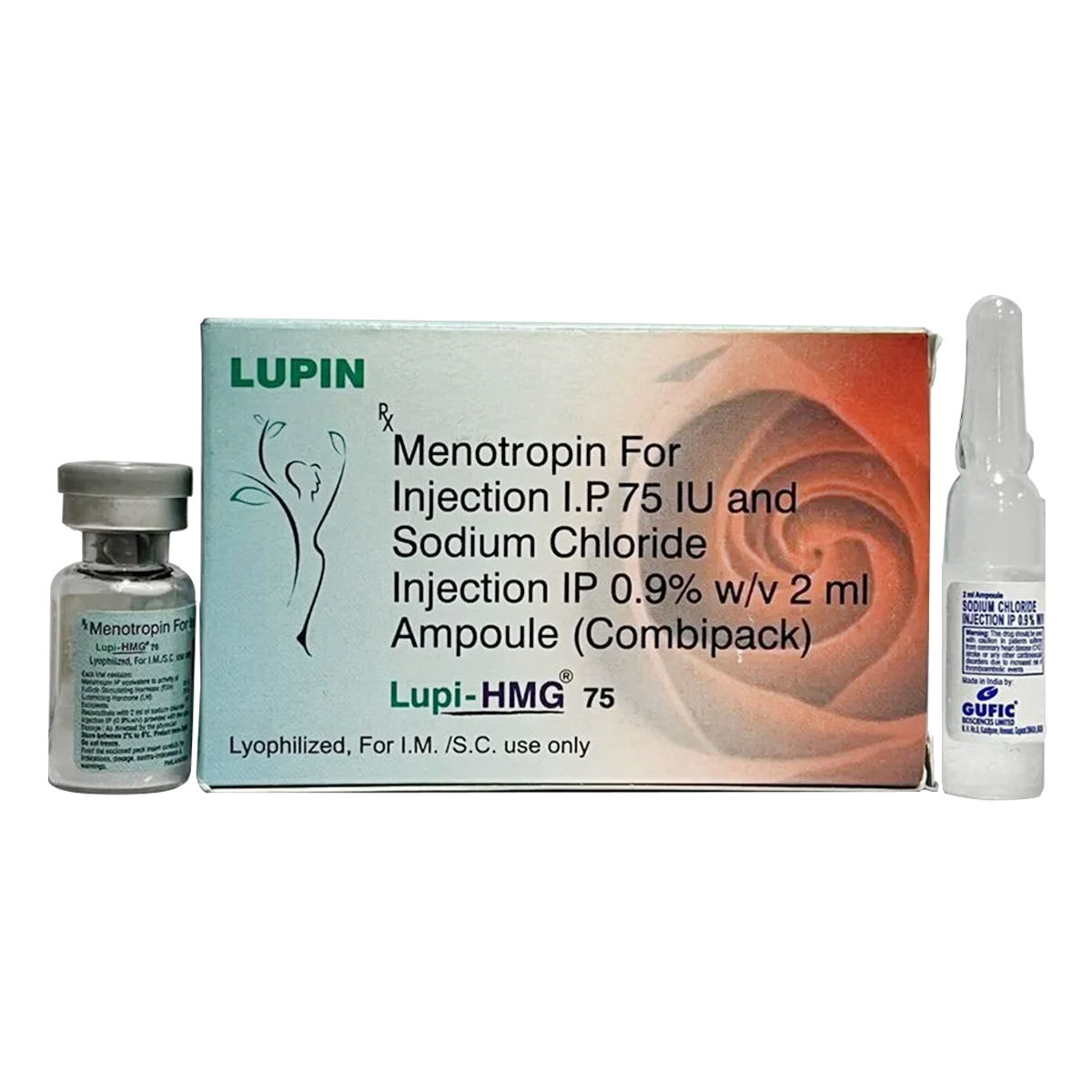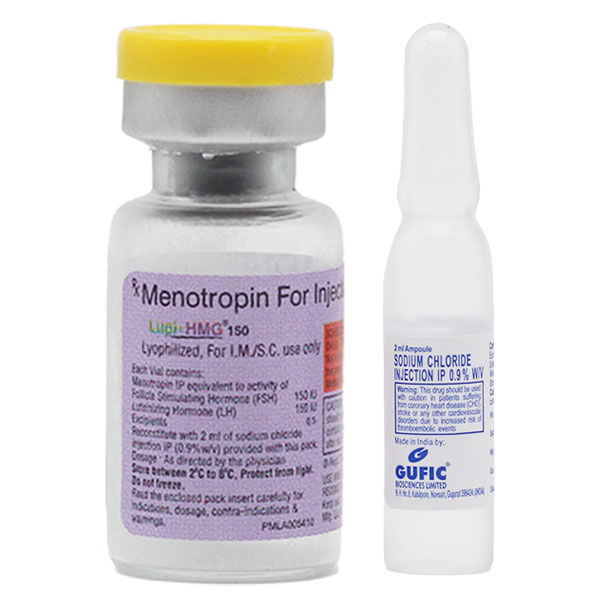Menotrophin
About Menotrophin
Menotrophin belongs to the group of medications known as sex hormone used to treat infertility in women who are not ovulating (producing an egg) properly, male infertility, and male hypogonadism. The problem with ovulation is a common cause of infertility in women. Female infertility is when the woman cannot conceive even after one year of trying or six months if the female is above age 35. If a female keeps having miscarriages, it is also known as Infertility. Male Infertility lacks the male's ability to cause pregnancy in a fertile female even after exposed intercourse.
Menotrophin contains 'Menotrophin', which is a sex hormone. In females, it is used to induce ovulation (egg production) in a woman who has problems with ovulation and wishes to get pregnant. In males, Menotrophin works by increasing male hormone production (testosterone), which helps treat conditions like low sperm count and delayed puberty.
Menotrophin is given by a doctor. You are advised to take Menotrophin for as long as your doctor has prescribed it for you, depending on your medical conditions. You may experience injection site pain, fatigue, headache, irritation, depression, and restlessness. Most of these side effects of Menotrophin do not require medical attention and gradually resolve over time. However, if the side effects persist or worsen, please consult your doctor.
Menotrophin should not be taken if you are allergic to Menotrophin or any other ingredients present in it. Avoid taking Menotrophin if you have a tumor. If you are female and have a tumor in the uterus and breast, inform your doctor before taking Menotrophin. Inform your doctor if you have testes cancer. If you are pregnant or a nursing mother, it is advised to consult a doctor before using Menotrophin. Menotrophin is not recommended for use in children. Menotrophin may affect your ability to drive. Therefore, avoid driving while using Menotrophin.
Uses of Menotrophin
Medicinal Benefits
Menotrophin helps in the normal growth of an egg in a female's ovary (female reproductive organ) and promotes the release of a matured egg, healthy. This helps to treat infertility in women and raises the chance of a successful pregnancy. It is also used to treat male infertility and male hypogonadism (it does not produce the hormone that develops sperms). Menotrophin contains 'Menotrophin', which is a sex hormone. In females, it is used to induce ovulation (egg production) in a woman who has problems with ovulation and wishes to get pregnant. In males, Menotrophin works by increasing male hormone production (testosterone), which helps treat circumstances like low sperm count and delayed puberty.
Directions for Use
Storage
Side Effects of Menotrophin
- Injection site pain
- Fatigue
- Headache
- Irritation
- Depression
- Restlessness
Drug Warnings
Menotrophin should not be taken if you are allergic to Menotrophin or any other ingredients present in it. Avoid taking Menotrophin if you have a tumor. If you are female and have a tumor in the uterus and breast, inform your doctor before taking Menotrophin. Inform your doctor if you have testes cancer. If you are pregnant or a nursing mother, it is advised to consult a doctor before using Menotrophin. Menotrophin is not recommended for use in children. Menotrophin may affect your ability to drive. Therefore, avoid driving while using Menotrophin. If you have a cyst in your ovaries, bleeding from the vagina for an unknown reason, uterus removed, then immediately inform your doctor before taking Menotrophin. Inform your doctor if you observe pain or swelling in the stomach, nausea or vomiting, diarrhoea, weight gain, difficulty breathing, and decreased urination.
Drug Interactions
Drug-Drug Interactions: Menotrophin should not be used with other infertility medicines (e.g. clomiphene citrate).
Drug-Food Interactions: Avoid or limit alcohol consumption, as it may increase the risk of side-effects of Menotrophin.
Drug-Disease Interactions: Menotrophin should be used with caution in patients with tumours (tumour in uterus and testes).
Drug-Drug Interactions Checker List:
Safety Advice

Alcohol
unsafeAlcohol consumption may worsen your condition and increase the risk of side effects.

Pregnancy
unsafeMenotrophin is a category C drug. It should not be given to pregnant women as Menotrophin may cause harm to the unborn baby.

Breast Feeding
cautionIt is not known that Menotrophin may pass into breast milk. Therefore, it should be used with caution in breastfeeding mothers.

Driving
cautionMenotrophin may affect your ability to drive, so do not drive or operate heavy machinery after taking Menotrophin until your vision gets normal.

Liver
cautionMenotrophin should be used with extreme caution in patients with liver disease as the liver metabolizes this medicine. Dose adjustments may be necessary.

Kidney
cautionMenotrophin can be used in patients with kidney diseases if clinically required.

Children
unsafeMenotrophin is not recommended for use in children.
Habit Forming
Diet & Lifestyle Advise
- Consume a healthy diet rich in fibre, proteins and low in carbohydrates and fats.
- Avoid processed or high-sugar foods.
- Stay active and shed excess weight if you are overweight or obese. Do not perform intense exercises as they may negatively impact your reproductive health. Increase the intensity of exercise gradually.
- Being underweight may also reduce your chances of getting pregnant. So, prepare a diet chart that can help you gain weight healthily.
- Avoid stress as it may decrease your chances of getting pregnant. Try relaxation techniques and receive support and counselling if necessary.
- Limit alcohol and caffeine intake.
- Quit smoking.
Patients Concern
Disease/Condition Glossary
Female Infertility: A woman is said to have fertility problems when she cannot become pregnant within a trying year. If a woman gets pregnant but experiences miscarriages or stillbirths, it is also included in infertility. The most common cause of infertility is the problem with ovulation or damage to the uterus.
Male Infertility: It is a lack of male ability to cause pregnancy in a fertile female even after exposed intercourse. It normally happens because of sperm that are irregular or have problems with ejaculation.
Male hypogonadism: It is a disorder in which the body does not make enough of the hormone that plays a key role in male sex development and growth during puberty or enough sperm or both.
FAQs
Generally, any injection can lead to pain. Menotrophin can cause mild tenderness (feeling of warmth) or numbness at the injection site. This is very normal for an injection procedure. If you experience intolerable pain after the injection, inform your doctor immediately.
Menotrophin can rarely cause breast pain and swelling of breasts. Inform your doctor if you feel any discomfort or side effect of Menotrophin and follow the advice given by your doctor.
In females, Menotrophin is used to induce ovulation (egg production) in a woman who has problems with ovulation and wishes to get pregnant. In males, Menotrophin works by increasing male hormone production (testosterone), which helps in treating conditions like low sperm count and delayed puberty.
If you have nausea, severe pelvic pain, diarrhoea, vomiting, trouble breathing, sudden weight gain, or reduced or no urination during treatment, then immediately contact your doctor.
Menotrophin contains Menotrophin, which belongs to the group of medications known as sex hormones. It is used to treat infertility in women who are not ovulating (not producing eggs properly), male infertility, and male hypogonadism (a condition where the body does not produce enough of a certain hormone, leading to problems with sexual function).
Yes, Menotrophin is often used in the treatment of male infertility (It is a lack of male ability to cause pregnancy in a fertile female even after exposed intercourse. It normally happens because of sperm that are irregular or have problems with ejaculation) and Male hypogonadism (a disorder in which the body does not make enough of the hormone that plays a key role in male sex development and growth during puberty or enough sperm or both).
Menotrophin is typically administered through injection, either subcutaneously (SC) or intramuscularly (IM). The treatment dose and duration may vary and are usually determined by a healthcare provider based on the individual's response. Please do not self-administer it.
If you miss a dose of Menotrophin, take it as soon as you remember unless it is almost time for your next dose. Do not double the dose to make up for a missed one.
The common side effects of Menotrophin include injection site pain, fatigue, headache, irritation, depression, and restlessness. Most of these side effects of Menotrophin do not require medical attention and gradually resolve over time. However, if the side effects persist or worsen, please consult your doctor.







